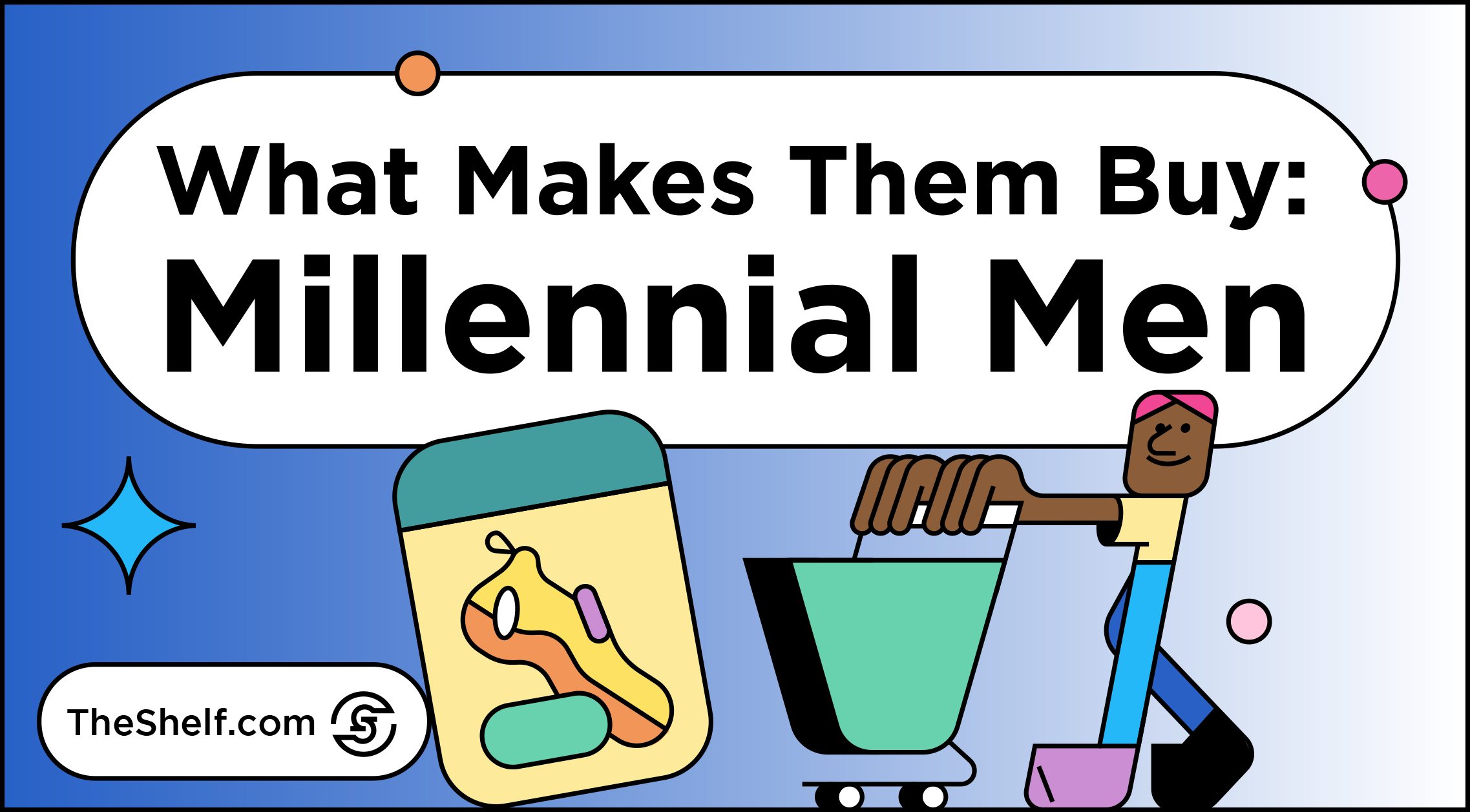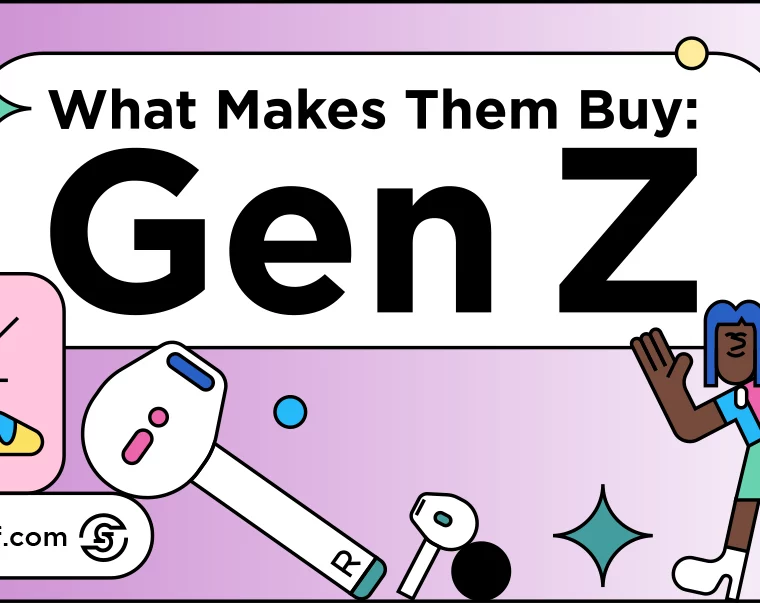What is it about Millennial Men that you need to know if you want them to spend money with you? A recent study by Goldman Sachs found that Millennial men are the driving force behind many current trends in consumerism.
These trends point to an important insight — this generation does things differently than the Boomers and Gen Xers before them. So if you want to know how to effectively market to Millennials and to Millennial Men, you pretty much need to understand what makes them tick.
Despite what you’ve heard, Millennials are not destroying every industry they touch. Instead, they’re just changing them (for the better). Consumerism has changed dramatically in recent years, and we can tie many of those changes directly to the arrival and impact of millennial consumers. And while some may see this as a negative thing, it’s created new opportunities for brands to reach and understand their target audiences more intimately.
What is a Millennial?
First, things first! If you want to know how to appeal to Millennials and the men among them, you need to know who they are. Pew Research Center defines them as anyone born between 1981 and 1996. Gen X precedes them, and Gen Z comes after them. So, marketing to Millennials in 2023 means focusing on the segment of the population in their late twenties to early forties.
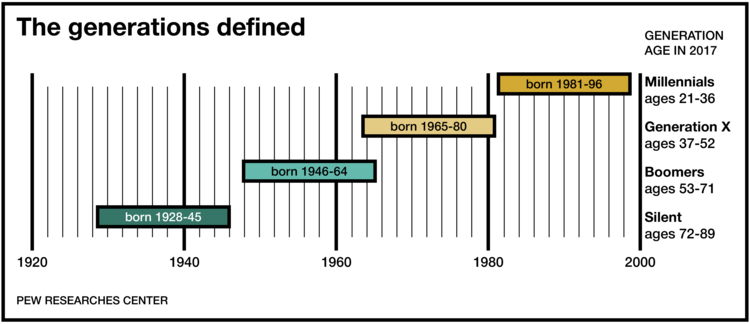
It’s worth noting that millennials are the largest living generation on earth. Millennials were the largest generation group in the U.S. in 2021, with an estimated population of 72.19 million. Globally, their numbers are about 1.8 billion.
Now, even at the higher end of the age group, millennials’ behavior is unlike any other generation at their age. But they aren’t aliens from Rigel VII. They’re just people who grew up in a different time, with different experiences, and who are approaching things from a unique perspective. (They’re also people with some expendable income and the power to make decisions for their households-the perfect recipe for a target audience).
In this post, we’re going to go over a few key traits to understand how to excel in marketing to Millennials in 2023 and beyond. These will help you to craft a UGC-based influencer marketing strategy that allows you to connect with this powerful generation in a way that resonates.
Yeah, They’re Different, But…
It’s true that targeting Millennial men is different from targeting Gen X and Boomers (at least until Millennial men start having kids). But that’s not really because Millennial men are weird. It actually has more to do with their levels of exposure.
In this post, I want to identify a handful of really important traits of Millennial men that you can leverage this holiday season during your campaigns. And when the shopping frenzy comes to an end, you can lean on these same traits to refine your marketing strategies during the Super Bowl and on into March Madness.
Saddle up.
Trait #1: Millennial Men Have Access to Tons of Information
Perhaps the single most important thing to understand when you’re marketing to Millennials is that they have access to an enormous amount of information. And they know how to to turn info into insights, especially when it comes to choosing which businesses to patronize.
These are people who lived through the Internet’s long march through our lives. By 2001, half of US households were surfing the net — and that’s when the oldest millennial men were 20 and the youngest were kindergarteners.
Today, these digital natives rule the internet, and they use it for everything. They aren’t waiting for ads to come to them and tell them what to buy. They are looking for products that will add value to their lives, and they are looking for information to help them make the best decisions.
The Information Age changed the brand-consumer dynamic
In the past, brands could depend on consumers remaining in the dark about their options and knowing only what they saw on TV. With a big enough budget, brands could use Superbowl ad to tell young Boomers and Gen Xers in America that their brand was the best thing since sliced Wonder bread. And many of them would believe it.
But that’s not the world we live in anymore. Millennials have more information at their fingertips than any generation before them, and they know how to use it.
Tech-savvy millennials can fact-check your message on the spot. And most of them will call brands out if they even think a brand is lying- and that’s if they take the time to pay attention to it at all.
This constant access to information has made Millennials more skeptical than any generation before them. And that’s not a bad thing! But it means marketing to Millennials requires a different approach.
Millennial men prefer authenticity over splashy ads
Authenticity is a buzzword, but it’s also often the only way into the budgets of Millennial men needs to be authentic. That’s what attracts Millennials to brands today. Simply hiring an influencer to endorse your brand won’t do anything for these independent thinkers. Traditional sponcon isn’t enough.
Millennials are incredibly skeptical. They can smell a sales pitch from a mile away, and they’ll quickly tune out anything that feels like it’s trying too hard to sell them something. Do you want the attention of the millennial man? The best way to get it is to focus on providing useful, relevant, and interesting information that will add value to his life.
Data-driven, well-targeted campaigns will grant you access to this powerful group of consumers.

Trait #2: Millennial Men Are the Most Educated Generation of Men in History
If that sounds like a killer stat, that’s because it is.
According to “15 Facts About Millennials,” a report released by the US Council of Economic Advisers (you can view and download that report here), Millennials are the most educated generation in US history.
In 2013, 47 percent of 25 to 34 year-olds had a post-secondary degree (Associates, Bachelor’s, or Graduate degree). Another 18 percent had attended college without earning a degree.
Only one percent of Millennials say they are moved by ads from brands. Instead, they make their buying decisions based on independent research, online reviews, and user-generated content.
Like Millennial women, Millennial men favor authenticity over ads and social proof over self-proclamations. Brand awareness aside, Millennial men are far more likely to trust the recommendation of a friend (even an online friend) over a multi-million-dollar Super Bowl spot.
That said, a Millennial man will likely respond to the same types of content his grandpa did – ads that are funny and clever, and ads that turn regular guys into heroes by putting them in extreme circumstances. I’m sure this explains how Captain America has made his way down through the generations over the last 82 years.


Point is… the way to a Millennial man’s heart (and wallet) isn’t through gimmicks and celebrity endorsements. They’re too smart for that, and we have seen too much as a society to believe the words of a celebrity whose only connection with a brand is the contract he signed to promote that brand.
Trait #3: Millennial Men Make Less Money Than Boomers
Okay… this isn’t a dig. But it’s becoming increasingly clear that Americans in their 30s to early 40s are less likely to outearn their parents than previous generations. That’s thanks in large part to stagnating wage growth. How stagnant is stagnant? In terms of the 2018 value of the US dollar, the average hourly wage has only risen the equivalent of$2.38 in 54 years. So, very, very stagnant. That’s despite the fact that Millennial men are the best-educated generation of men this country has ever seen.
You might wonder how to market to Millennials if they are all impoverished, unable to scrape together enough dollars for a Starbucks drink every morning. Nah. Who am I kidding? You know better than that!
Millennials’ spending power is $2.5 trillion. Yes, trillion. With a T. But the oldest American millennials have survived five recessions, not including the current “inflationary environment” or “recessive market” situation in which we currently find ourselves.
- The average college-educated Millennial has more debt in the form of student loans than did their parents at the same age. Plus:
- Millennials are less likely to have jobs while attending college
- Millennials have experienced slower wage growth than Gen Xers and Boomers.
- Millennials aren’t buying homes at the rates their parents did. They are renting longer and living in multigenerational homes.
- Nearly 1 in 3 Millennials under the age of 35 live in multigenerational households, more than any other generation. Men between the ages of 25 and 34 are more likely than women the same age to live in multigenerational homes.
Percentage-wise, there are as many Americans living in multigenerational homes now (20 percent) as there were in the years following the Great Depression (21 percent). In stark contrast, in 1980, when Boomers were in their 20s and 30s, only 12 percent of them lived in multigenerational homes.
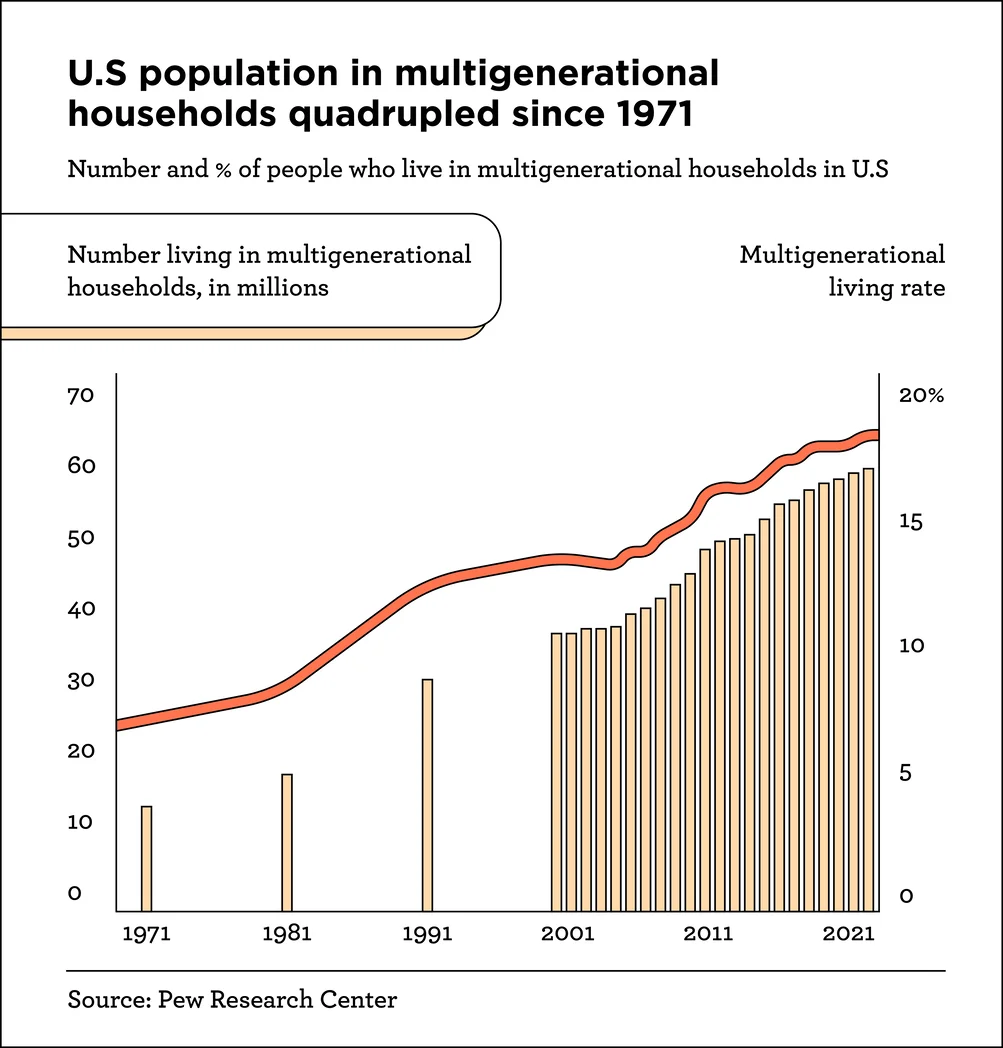
This affects their perception of economic insecurity, they are much more strict about how they use their money.
More Millennials in North America have a professional financial advisor than any other generation – 72 percent of Millennials have them, compared to 66 percent of Generation Xers, and 70 percent of Baby Boomers.
Older generations sometimes associate so-called Generation Y with being lazy and uninterested in long-term planning, but lo. and behold! They’re wrong again!😂😂😂 Millennials save more for retirement than any other generation – socking away nearly $1 for every $5 earned.
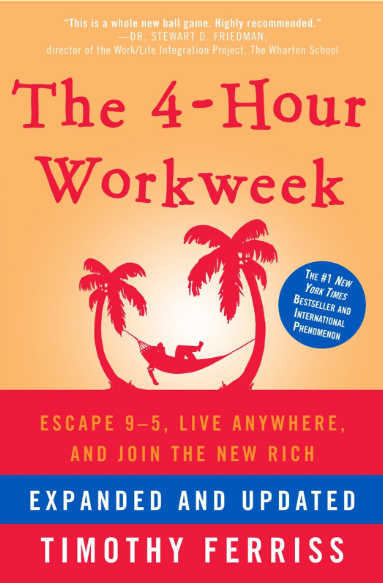
This generation’s relationship with money may not be considered the norm, but they show a generational mindset best summarized by the immortal words of Snoop Dogg: “I got my mind on my money and my money on my mind.”
But don’t cry for Millennials just yet. While Millennials are earning less than their parents did at their age, a recent survey found that Millennials are also more likely to plan their spending than Gen Xers and Boomers.
In fact, older Millennials and younger Gen Xers were the primary participants in the life design movement that Tim Ferriss kicked off with his New York Times best-selling book, The 4-Hour Workweek a decade ago, a lifestyle centered around the idea of living richly by spending money and time on the things that matter most to you.
CEO and author of I Will Teach You to Be Rich, Ramit Sethi starts off his Personal Finance class at CreativeLive.com this way: “I don’t know… Is anyone else tired of 65 year-old guys telling us we can’t spend money on lattes?”
Life design is about investing in the things you want and restricting the resources you put into the things you don’t want. For some Millennials that could mean downsizing your living situation after getting a much-deserved raise and spending more on international travel.
It could mean renting a house instead of buying a home, or using rideshare services instead of buying a car and using the money you save to explore other passions or fulfill other indulgences, like eating out, or subscription meal services.
Most of us probably can’t imagine our parents being okay with that. When it comes to things like renting vs buying or skipping vacations right now and saving them all for your retirement years, Millennials are the anti-Boomer. But Millennials do spend on the things that matter to them.
According to Charles Schwab, 34 percent of Millennials have a written financial plan compared to 21 percent of Gen Xers and 18 percent of Boomers.
That said, you need to play the long game. Millennials are planners and researchers with more than enough information at their fingertips to learn what they want to know about new products and services.
Trait #4. Millennial Men Value Experiences Over Shiny New Things
Millennial men are known to prefer experiences to things. That’s not to say they don’t enjoy the occasional material purchase, but they would rather spend their money on an amazing vacation than a new car. About 77 percent of Millennial men prefer an experience-rich existence, with fewer possessions.
This focus on experiences over things has led Millennials to be a driving force behind the growth of the sharing economy over the past decade. They have access to apps that allow them to temporarily rent anything they’d ever need. This causes ownership to look more like an expensive hassle than a life goal.
Nearly 8 in 10 consumers (78 percent) believe the sharing economy reduces waste and clutter. And millennial men are certainly doing their part to make that happen. Millennials pride themselves on being acutely aware of the environmental issues facing the world today; they also expect the brands they support to be socially responsible.
You may be wondering how to convert product offerings into valuable experiences. The answer is fairly simple. Create beautiful experiences by being authentic, community-minded, and focused on helping your customers connect with who and what they value.
Nike is a mensa-level genius at practicing this model. It doesn’t just sell shoes and workout clothes. It also offers a comprehensive app that allows users to shop, save their preferences, and join a run club, a fitness club, or SNKRS, a space for sneaker enthusiasts where they can unlock rare sneakers. Users can also track their fitness goal progress, share their successes with friends, compete in challenges, and register for virtual or live events.
It’s this focus on community and connection that has helped Nike+ become one of the most popular fitness apps with Millennials.
Trait #5: Millennial Men Do Shop… More Than Their Dads and Grandpas Ever Did
Make no mistake about it – Millennial men spend on things.
So, Millennial men have money, and they spend it. Millennial men are willing to shell out more money for a product if it will last longer than a similar product of lesser quality. This is especially true of Millennial dads, who tend not to be coupon-clippers, even during the early years of building a family.
By and large, 66 percent of Millennial dads prefer quality products that they think are the best for their families, as opposed to what’s most convenient or the least expensive.
Millennial men buy clothes more often than did men one generation ago, picking up new apparel items at least twice a month. They also tend to be early adopters of new technologies and products.
Millennial men spend an average of $2,200 a year in retail, directing their spending toward home improvement, apparel, digital, electronics, and mass merchandisers, and they tend to shop alone.
Trait #6: Millennial Men Defer to Social Media for Purchasing Decisions
About 70 percent of Millennial men use social media, according to Nielson Newswire. They use blogs, online news websites, and social networking sites to make purchase decisions.
As well, 45 percent Millennial dads typically use search to get answers to questions on everything from the best baby products to the best cities for families. This they do in lieu of getting advice from their own dads.
Far more than Boomer dads, Millennial dads are kicking in on one-on-one time with the kids, shopping decisions and housework. As most Millennial families are two-income households (sort of goes back to what I talked about in Trait #3), the changing role of fathers in the home is just too big for marketers to ignore.
Millennial dads dedicate 28 percent of their time online to dad-dedicated content and 60 percent of Millennial fathers say they’re better dads because of the resources they’re able to find online.
There’s an opportunity here, of course. Most brands target moms with respect to things like grocery shopping, household items, and child-rearing. Many Millennial dads are feeling like there’s not enough brand-owned content online that’s specifically for fathers. Remember how I said men like seeing themselves as the hero in ads? Well, dads do, too. And typically, dads are positioned in TV ads and other content as add-ons, like a cool Texan uncle who smells like leather and tells great stories (sorry, I was in Dallas over the weekend).
Millennial dads are looking for brands that produce quality products and that are listening and responsive. If you can accomplish that, you’ll get Millennial dads on your team.
There’s one important thing I’m not mentioning here, though. Ad blockers. Which brings us to our next important trait.
Trait #7: Millennial Men Are Among the Biggest Users of Ad Blockers.
Insider Intelligence reports that nearly 40 percent of internet users are using ad blockers, with adult men under the age of 35 being the most likely to use an ad blocker on at least one of their devices. And for men in their 20s, the percentage of users is upwards of 61 percent.
Just a quick tip: More men follow influencers than women. So, influencer marketing serves as a great hedge against ad blockers for this demographic.
Trait #8: Millennial Men Expect More Out of Brands
Millennials hold brands to a higher social standard than previous generations. They expect the retailers and service providers to be helpful at every stage of the sales process, and responsive after a sale is complete. They also expect brands to take on the responsibility to do good out in the community. When they find brands who are crushing it in business and in the community, Millennials tend to stick with them.
The Elite Daily study I mentioned earlier confirms that 62 percent of Millennials demonstrated more loyalty to brands that engaged with their customers on social networks. In fact, half of the Millennials surveyed consider themselves brand-loyal. Millennials, as a whole, are more loyal to brands than Gen Xers and Boomers, in part because of the level of social proof and transparency social media offers.
Final Thoughts For Marketing to Millennials 2023
Knowing how to market to Millennials, male or otherwise, really comes down to understanding the world they live in. They are bombarded with information 24 hours a day from every conceivable angle. To reach them, brands need to be authentic, community-minded, and focused on helping Millennials connect with the people and things they care about.
Millennials are now and the future. And, with a little bit of understanding, your brand can be too. Here’s a quick recap of what you need to know about marketing to millennials.

Millennials are the most connected, educated, and tech-savvy generation ever. They grew up with the Internet, social media, and smartphones. And they’re using all of these things to their advantage.
Millennials are also known as digital natives or netizens. And there are a lot of them. Millennials make up the largest generation in history, with over 72 million people in the United States, and 1.8 billion worldwide.
Millennials have completely changed the way we think about marketing. They’re not interested in traditional advertising, and they’re not easily influenced by it either. Millennials are much more likely to trust peer recommendations over ads. Millennials say user-generated content (UGC) from reviews and social media posts is a major factor in their purchasing decisions.
A Social Media Today survey revealed that the vast majority of those polled said that user-generated content (UGC) is the most authentic, with almost 80 percent admitting that UGC highly impacts their purchasing decisions. This makes it 8.7x more impactful than influencer content and 6.6x more influential than branded content in consumers’ eyes.
The best way to reach Millennials is by using influencer marketing. We’ll pair you with a vetted, trusted, influencer in your industry that will create organic posts featuring your brand. It’s an effective way to reach Millennials because it’s more authentic and personal than traditional advertising.
You’re ready to take your marketing to the next level. We’re ready to help you get there. Book an obligation-free strategy call with one of our Influencer Marketing Jedis today Let us blow your mind, then launch the campaign of your dreams, then blow your mind again. In that order.


